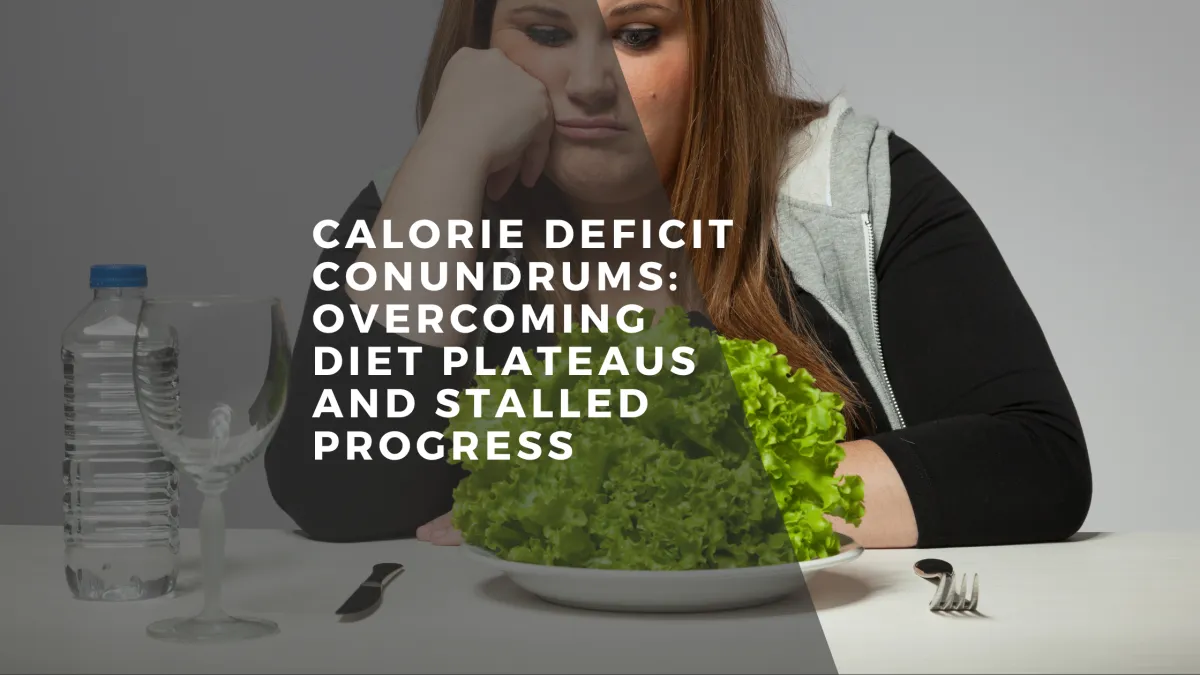Bicester's #1 Body Transformation Centre
Discover Your Best Self with Personalised Nutrition, Fitness, Support In A Private Gym In Bicester

Calorie Deficit Conundrums: Overcoming Diet Plateaus and Stalled Progress
Despite sticking to a “believed” calorie deficit, the scale refuses to budge. In this post, we’ll explore why diets stall and offer practical solutions to overcome these hurdles, ensuring continuous progress towards your weight goals.
Table of Contents
1. Understanding the Diet Plateau
- What is a Diet Plateau?
- Why Does It Happen?
2. Common Reasons for Diet Stalls
- Metabolic Adaptation
- Underestimating Caloric Intake
- Overestimating Caloric Expenditure
- Loss of Initial Water Weight
- Changes in Physical Activity
- Hormonal Factors
3. Overcoming Diet Plateaus
- Re-evaluate Your Caloric Needs
- Track Everything More Accurately
- Adjust Macronutrient Ratios
- Increase Physical Activity
- Incorporate Diet Breaks
- Focus on Non-Scale Victories
- Manage Stress and Sleep
4. Conclusion
- Key Takeaways
- Continuous Adaptation for Long-Term Success
1. Understanding the Diet Plateau
What is a Diet Plateau?
A diet plateau occurs when your weight loss stalls despite maintaining a “believed” calorie deficit. It’s a common phase where progress halts, leading to frustration and often confusion.
Why Does It Happen?
Plateaus are often a result of your body adapting to your current diet and exercise regime, making it harder to continue losing weight with the same calorie intake.
2. Common Reasons for Diet Stalls
Metabolic Adaptation
Your body’s metabolism can slow down as weight loss happens, making you more efficient at using the available energy. This process, known as metabolic adaptation, can significantly reduce the number of calories burned at rest.
Underestimating Caloric Intake
Even small inaccuracies in tracking your food can lead to underestimating your total caloric intake. Hidden calories in condiments, cooking oils, and beverages often go unnoticed.
Overestimating Caloric Expenditure
Many people overestimate the calories burned during exercise. Additionally, increased physical activity can lead to compensatory behaviours, such as eating more or reducing other daily activities.
Loss of Initial Water Weight
The initial rapid weight loss often includes a significant amount of water. As you continue your diet, weight loss will slow as your body shifts to burning fat.
Changes in Physical Activity
Non-Exercise Activity Thermogenesis (NEAT)—the calories burned through just daily activities—can decrease when you're in a calorie deficit. You might unconsciously move less, offsetting the calorie deficit from your diet.
Hormonal Factors
Dieting can influence hormones like leptin and ghrelin, which regulate hunger and metabolism. Changes in these hormones can affect appetite and energy expenditure, contributing to a plateau.
3. Overcoming Diet Plateaus
Re-evaluate Your Caloric Needs
As you lose weight, your calorie needs decrease. Recalculate your daily caloric intake based on your current weight, activity level, and goals.
Track Everything More Accurately
Ensure meticulous tracking of your food intake, including hidden calories. Use a food diary or an app to monitor everything you eat and drink. Weighing portions instead of estimating can improve accuracy.
Adjust Macronutrient Ratios
Tweaking your macronutrient ratios can reignite fat loss. For instance, increasing protein can boost satiety and thermogenesis, while adjusting carb and fat intake might help break through a plateau.
Increase Physical Activity
Incorporate more movement into your day through NEAT activities like walking, standing, or taking stairs more often. Additionally, consider varying your exercise routine to challenge your body in new ways, such as incorporating high-intensity sessions (like our C4 sessions) when you are ready for them.
Incorporate Diet Breaks
Scheduled diet breaks or "refeed" days (NOT cheat days!) can help reset your metabolism and replenish glycogen stores, which may boost and support continued weight loss.
Focus on Non-Scale Victories
Instead of solely relying on the scale weight loss, measure progress through other means like body measurements, fitness milestones, or how your (non-elastic) clothes fit. This approach can provide a broader view of your health and fitness improvements.
Manage Stress and Sleep
Chronic stress and lack of sleep can affect hormones that control hunger and metabolism. Prioritize stress management techniques and aim for 7-9 hours of quality sleep each night to support your weight loss efforts.
Key Takeaways
Diet plateaus are a natural part of the weight loss process. Understanding why they occur and having strategies to overcome them can keep you on track.
Continuous Adaptation for Long-Term Success
Adapting your diet and lifestyle as you progress is crucial for long-term success. Stay patient, be flexible with your approach, and celebrate small victories along the way.
Embrace the journey of weight loss with its ups and downs. By implementing these strategies, you’ll be better equipped to overcome plateaus and continue making progress towards your goals.

Copyright 2025 | 1st4Fitness LTD | All Rights Reserved | Privacy Policy | Terms & Conditions



